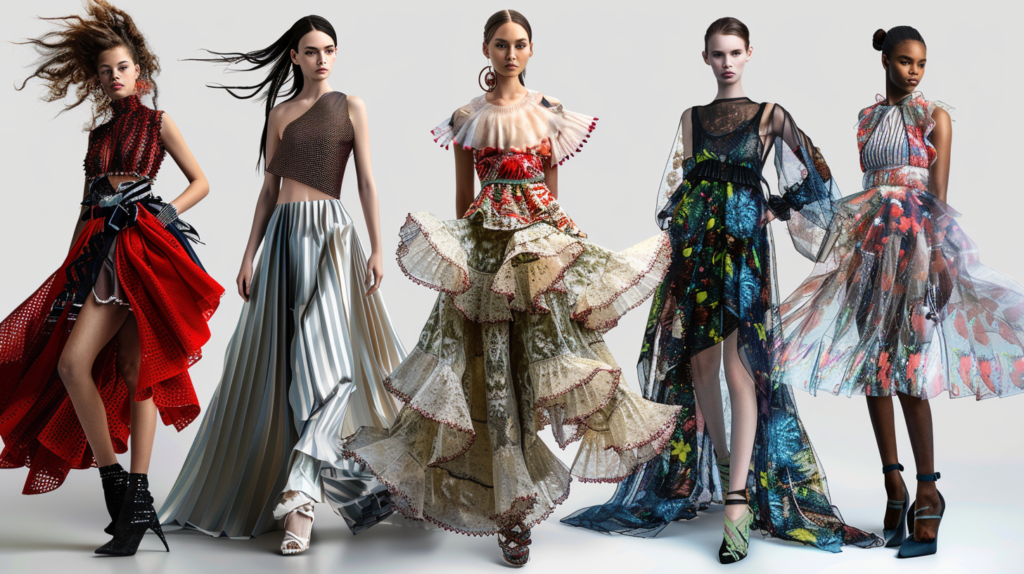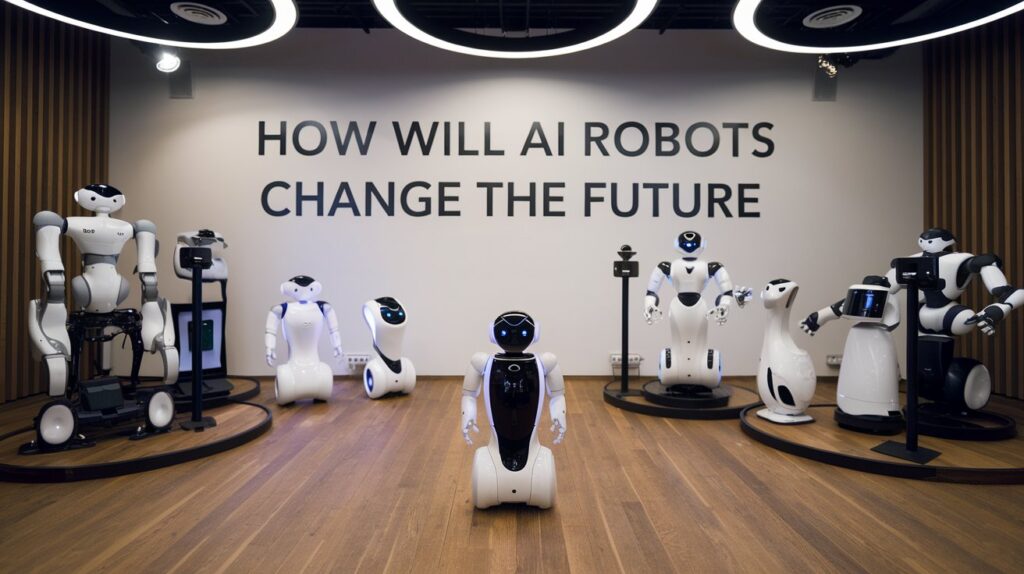What Is the Future of Fashion Industry With Ai?

The future of the fashion industry with AI is poised for transformative growth. AI-driven personalized styling and customer engagement are reshaping loyalty and sales dynamics, offering tailored recommendations with precision. Sustainability advancements leverage AI to address environmental concerns, aligning with consumer priorities. Creativity and design are undergoing a revolutionary shift, with AI enabling unique expressions and sustainable innovations. Trend forecasting and market insights have become more precise, enhancing strategic decisions. Additionally, advancements in virtual sizing and customer experience are setting new benchmarks in inclusivity and satisfaction. Ethical considerations remain paramount, focusing on data privacy and algorithm bias. The exploration of these facets unveils a dynamic evolution in fashion retailing.

Personalized Styling Revolution
The advent of AI-driven personalized styling solutions marks a transformative shift in the fashion industry, significantly enhancing customer engagement through meticulously tailored recommendations that cater to individual preferences. This new paradigm in fashion design leverages AI to analyze vast datasets, discerning patterns and preferences unique to each customer. By doing so, brands like Stitch Fix and Styleriser are at the forefront, offering personalized styling services that not only meet but exceed customer expectations.
With 73% of customers demanding brands to recognize their unique tastes, AI’s role becomes indispensable in crafting a shopping experience that feels both intimate and bespoke. This approach to personalized styling is not merely about keeping up with trends but about creating a deep, data-driven understanding of what each customer desires. As a result, the recommendations made are not generic; they are a reflection of an individual’s style, leading to a more satisfying shopping journey.
The impact of personalized styling on customer loyalty cannot be overstated. With statistics indicating that 56% of customers are more likely to become repeat buyers after personalized experiences, it’s clear that AI-driven solutions are not just enhancing the customer experience; they are reshaping how loyalty is built and maintained in the fashion industry.
Sustainability Achievements
Amid growing environmental concerns, the fashion industry’s embrace of AI for sustainable advancements showcases a promising shift towards eco-conscious production and waste reduction. With the alarming statistic that the fashion industry generates 186 billion pounds of textile waste annually, of which 87% ends up in landfills, the urgency for sustainable practices has never been more critical. AI technologies, such as Refiberd’s AI Waste Sorting System, are at the forefront of recycling efforts, successfully redirecting up to 70% of textile waste from landfills. This innovation, coupled with RFID technology used by giants like H&M and Zara, has revolutionized informed forecasting, significantly minimizing waste.
The shift towards sustainability is also driven by consumer demand, particularly from Gen-Z shoppers, who prioritize eco-friendly initiatives over brand names. This demographic shift underscores the importance of integrating AI into sustainable practices within the fashion industry. By leveraging AI for informed decision-making and efficient waste management, the industry is making strides towards reducing its environmental footprint. As AI continues to evolve, its role in promoting eco-conscious production and waste reduction becomes increasingly indispensable, marking a new era of sustainability in fashion.
AI-Driven Creativity

Harnessing the power of AI, the fashion industry is witnessing a revolutionary shift in creativity, with brands and designers exploring new frontiers in design expression and innovation. AI-driven creativity is not just a buzzword but a tangible reality that’s reshaping how we think about fashion, from the drawing board to the runway. This technological evolution is enabling unique design expressions and cost-effective content creation, setting a new benchmark for what’s possible in fashion design and manufacturing.
- Unique Design Expressions: AI models like Dall-E and Midjourney are at the forefront, generating unprecedented jewelry and clothing design ideas. These tools are empowering designers at Mango, Nike, and beyond to push the boundaries of creativity, resulting in prints, fabrics, and eco-friendly products that were once deemed impossible.
- Cost-Effective Content Creation: The use of AI in fashion design streamlines the creative process, making it more efficient and significantly less costly. AI systems like AiDA and Inspire assist in creating one-of-a-kind pieces, enabling brands to produce innovative designs without the traditional overheads.
- Eco-friendly Innovations: The emphasis on designing eco-friendly products using AI showcases a commitment to sustainability, marrying innovation with environmental consciousness.
In this landscape, AI-driven creativity is not just altering the aesthetics of fashion but also its ethos, making it an exciting era for the industry.
Trend Forecasting Innovation
In an era where data reigns supreme, AI-driven trend forecasting is revolutionizing the fashion industry by offering unprecedented precision in predicting future styles and consumer preferences. AI tools such as Heuritech and Trendalytics leverage comprehensive data analysis, including social media insights and search trends, to anticipate market movements. This not only aligns collections with customer preferences but also maximizes sales potential by ensuring products resonate with current desires.
| Benefit | Emotion Evoked |
|---|---|
| Accurate Predictions | Confidence |
| Customer Alignment | Satisfaction |
| Sales Maximization | Excitement |
| Informed Decisions | Security |
| Competitive Advantage | Aspiration |
Virtual Sizing Improvements
The fashion industry’s quest for inclusivity and precision in online shopping has been significantly advanced by AI-driven virtual sizing technologies. These innovations are reshaping how consumers interact with fashion online, promising a future where shopping experiences are more personalized and reflective of the diverse customer base.
- Nike Fit scans users’ feet with a smartphone camera to recommend accurate shoe sizes, showcasing the precision possible with AI-driven solutions.
- Be Your Own Model, introduced by Walmart, allows customers to see clothes on themselves through virtual try-ons, addressing the desire for more personalized and realistic shopping experiences.
- AI-generated models support virtual try-ons, ensuring that all body types are represented and reducing the gap in inclusivity within the fashion industry.
These advancements not only cater to the demand for better virtual sizing and try-on experiences but also alleviate consumer frustrations related to fit certainty. By enhancing the accuracy of online shopping experiences, AI-driven solutions like virtual sizing and try-ons are pivotal in improving the overall customer experience. They reduce returns and increase satisfaction, marking a significant step forward in addressing long-standing challenges in the fashion industry.
Supply Chain Optimization
A significant transformation within the fashion industry’s supply chain management has been catalyzed by the integration of Artificial Intelligence (AI), optimizing operations from inventory management to sustainable sourcing. AI’s predictive capabilities enable fashion brands to forecast demand with unprecedented accuracy, ensuring that inventory levels are precisely aligned with consumer needs. This not only minimizes overproduction but also supports sustainable practices by reducing waste.
| AI Application | Benefit | Impact on Fashion Industry |
|---|---|---|
| Demand Prediction | Efficiency | Optimized Inventory Management |
| Logistics Management | Reduced Carbon Footprint | Sustainable Shipping Practices |
| Sustainable Sourcing | Transparency | Ethical Raw Material Procurement |
Moreover, AI-driven logistics management is revolutionizing the way fashion items are distributed, significantly lowering the industry’s carbon footprint through route optimization and thus saving time. Additionally, the utilization of AI in sourcing and production processes not only enhances efficiency and reduces waste but also fosters sustainable raw material procurement. These AI-driven solutions not only streamline production but also enhance supply chain transparency and traceability, essential for promoting sustainable practices within the fashion industry. Consequently, the integration of AI into supply chain optimization heralds a new era of efficiency, sustainability, and accountability in fashion.
Counterfeit Detection
Artificial Intelligence (AI) stands at the forefront of combating the pervasive challenge of counterfeit fashion products, employing advanced technologies to safeguard brand integrity and protect consumer interests. With the global counterfeit fashion market estimated to be worth billions, the urgency for effective detection measures is paramount. AI, leveraging machine learning algorithms and blockchain technology, offers a robust solution to this issue.
- Machine Learning Algorithms: These algorithms meticulously analyze patterns, materials, and intricate details of fashion items, distinguishing authentic products from counterfeit ones with remarkable accuracy.
- Blockchain Technology: It ensures the traceability and transparency of the product’s journey, making authentication processes more secure and tamper-proof.
- Real-time Authentication: AI-driven solutions provide immediate verification, significantly enhancing consumer trust and diminishing the sale of counterfeit goods within the global market.
Enhancing Shopping Experiences

Innovative AI technologies are revolutionizing the shopping experience, offering personalized and immersive ways for consumers to engage with fashion brands. AI in fashion is not just a futuristic concept but a current reality enhancing customer experience through personalized shopping experiences. By analyzing individual customer interactions, AI tailors recommendations, ensuring that consumers find what they are genuinely interested in.
Virtual try-ons are a standout AI-driven solution, significantly enhancing the online shopping experience. Technologies such as Nike Fit leverage smartphone cameras to recommend accurate shoe sizes, while Walmart’s Be Your Own Model allows users to see clothes on AI-generated models of themselves. This not only promotes inclusivity but also addresses the common issue of fit certainty, potentially reducing returns and increasing customer satisfaction.
Moreover, AI-generated models are making virtual try-ons more relatable and effective. By alleviating consumer frustrations associated with guessing how a garment might look on their unique body type, these AI-driven innovations are setting a new standard in online fashion retail.
The future of fashion, with AI at its core, promises an era of unprecedented convenience and personalization. As brands continuously integrate AI-driven solutions, the enhancement of shopping experiences is poised to redefine consumer expectations and the fashion landscape at large.
Ethical Considerations
While AI technologies offer transformative potential for the fashion industry, they also bring to the forefront significant ethical considerations that must be meticulously addressed. The integration of AI raises questions about:
- The safeguarding of data privacy, ensuring that personal information collected through AI-powered platforms is protected from misuse.
- Addressing algorithm bias to prevent discriminatory practices in fashion marketing and product recommendations.
- Upholding intellectual property rights in an era where AI can generate designs that may inadvertently mimic existing creations.
These concerns extend to the impact of AI on job displacement, as automation could replace human roles, and cultural appropriation, where AI might unknowingly use culturally sensitive elements without proper context or respect. Moreover, the drive for environmental sustainability challenges the fashion industry to deploy AI in ways that reduce waste and energy consumption, rather than exacerbate ecological footprints.
Ethical dilemmas further encompass the need for transparency in AI decision-making processes, accountability for AI-generated content, and fair compensation for those whose designs and ideas are used by AI. Balancing creativity and authenticity with AI automation prompts a reevaluation of the value of human input and traditional craftsmanship, ensuring that the future of fashion respects both innovation and heritage.

Frequently Asked Questions
How Technology Will Change the Future of Fashion?
The future of fashion, influenced by technology, promises a transformative shift towards more personalized, efficient, and sustainable practices. Innovations like virtual try-ons and AI-driven trend analysis will redefine consumer experiences and industry standards.
Can AI Replace Humans in Fashion Design?
AI may not replace humans in fashion design entirely but rather augment human creativity by rapidly generating designs and enabling more efficient workflows. Challenges include integrating AI seamlessly and mitigating job displacement.
How to Use AI to Predict Fashion Trends?
To utilize AI in predicting fashion trends, companies integrate advanced algorithms to analyze vast datasets from digital platforms, enabling precise trend forecasting and empowering brands to make informed, forward-looking design and production decisions.
What Is the Future of Fashion Industry?
The future of the fashion industry signifies a transformative era where technology plays a pivotal role in revolutionizing design, manufacturing, and retail processes, promising enhanced sustainability, efficiency, and unparalleled personalized consumer experiences.
Conclusion
In conclusion, the integration of artificial intelligence within the fashion industry heralds a transformative era characterized by enhanced personalization, sustainability, and efficiency. Through AI’s application in styling, creativity, trend forecasting, and supply chain management, the sector is poised for significant advancements.
However, it is imperative to navigate these technological innovations with ethical considerations at the forefront, ensuring that the evolution of fashion through AI benefits all stakeholders while mitigating potential negative impacts on society and the environment.







Amazing!!! And this is the place to get inspired.
Næææææ-….